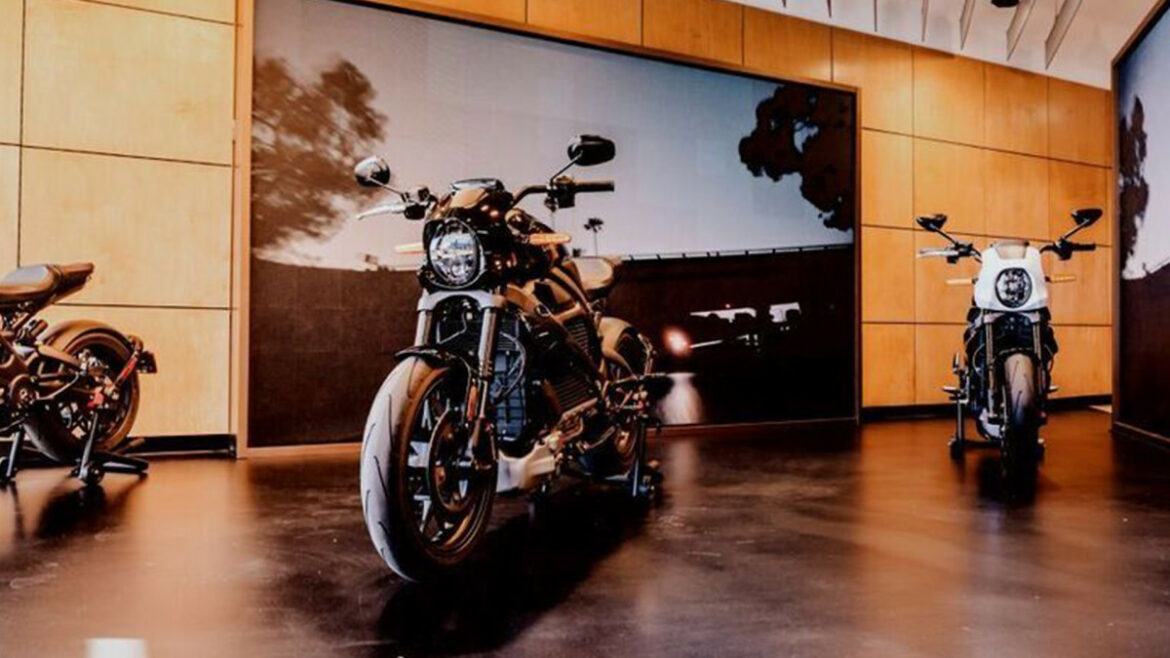Ray Weishaar never took a victory lap by himself.
Weishaar, a 1920s racing champion, was a member of Harley-Davidson’s (HOG) “Wrecking Crew” team. When he and his fellow riders won an event, they’d take a spin around the track holding the team’s mascot: a small pig.
Wiring the Hog
There are so many photos of Weishaar and his porcine companion that Harley-Davidson motorcycles came to be called “hogs,” an association that has carried over to the iconic company’s ticker symbol.
Now Harley-Davidson is entering new chapter as the company’s LiveWire electric motorcycle division is scheduled to go to public on Sept. 26 by merging with special-purpose-acquisition company AEA-Bridges Impact (IMPX) .
The offering makes LiveWire the first electric motorcycle company to go public. Shares of AEA-Bridges were soaring nearly 24% to $9.63 at last check.
Harley introduced the LiveWire bike in 2014 and announced its plan to spin off the subsidiary last year.
When Harley unveiled its less-expensive LiveWire S2 Del Mar in May, the first 100 units of the limited Launch Edition sold out in just under 18 minutes. The next round of reservations is slated to kick off on September 27 at 9:30 a.m. ET.
‘The Most Desirable Brand in the World’
LiveWire’s ambition, Harley-Davidson said back in June, “is to be the most desirable electric motorcycle brand in the world.”
Harley is certainly not alone in its electrification endeavors. Honda recently announced that it plans to introduce 10 electric motorcycles worldwide by 2025.
The Japanese company said it wants to boost annual sales of electric models to 1 million units within the next five years, and 3.5 million units, or about 15% of total unit sales, as of 2030.
And there are plenty of other companies looking to get a share of the market, including BWM (BMWYY) , Zero, and Energica.
So how do things look out there?
Peter Wells, professor of business and sustainability at Cardiff University, sees the motorcycle as kind of a loner in the electric vehicle arena.
“Electric bicycles, unlike motorcycles, have boomed without government support for the simple reason that putting a modest battery in a bicycle makes for a better bicycle for most people most of the time,” he said.
‘Still the Wild Es’
“At the other end of the personal transport spectrum, cars in which batteries are installed are heavier, more expensive, and with reduced range relative to their petrol or diesel counterparts,” he said. “So, governments have poured in positive policy incentives for consumers and industry in an attempt to make the transition to battery electric cars a reality.”
Somewhere in between, he said, are motorcycles–“unloved by motorists, cyclists, and pedestrians alike, with no great industrial lobbying power, and a ‘diehard’ consumer base wedded to the visceral thrill of the motorcycle experience.”
“In many respects, an electric motorcycle is better than a petrol version, but is this enough to compensate riders for the loss of the emotional engagement?” Wells said. “In those markets where motorcycles are more of a weekend blast, one can imagine that consumers are more obdurate, and less willing to embrace electrification.”
Charles Falco, a professor with the University of Arizona, said that, at the moment, “there are no big players in the electric motorcycle area so it’s still the Wild West.”
“Basically, relatively few people ‘need’ a motorcycle for practical uses,” he said, “which means most owners have them for leisure use.”
‘Aging Owners’
Falco noted that Harley’s demographic has aged nearly one year every year, “with essentially all H-D owners insisting on machines that have a particular look and sound that hasn’t changed for over a half-century.”
“Few of those aging owners seem likely candidates for purchasing an electric motorcycle despite having the H-D logo on it,” he said. “At the same time, young motorcycle riders and potential riders either aren’t interested in the H-D logo, or are even put off by it as something their grandfather would own.”
Falco believes Honda is in one of the best positions in the electric bike market.
“Unlike H-D, Honda’s customers are used to them offering machines with a wide range of looks and specifications,” he said. “They have a good reputation for engineering, and Honda doesn’t have any negative stereotypes hanging over them that might keep a non-motorcyclist from considering one of their electric motorcycles.”
Harley-Davidson did not immediately respond to a request for comment.

